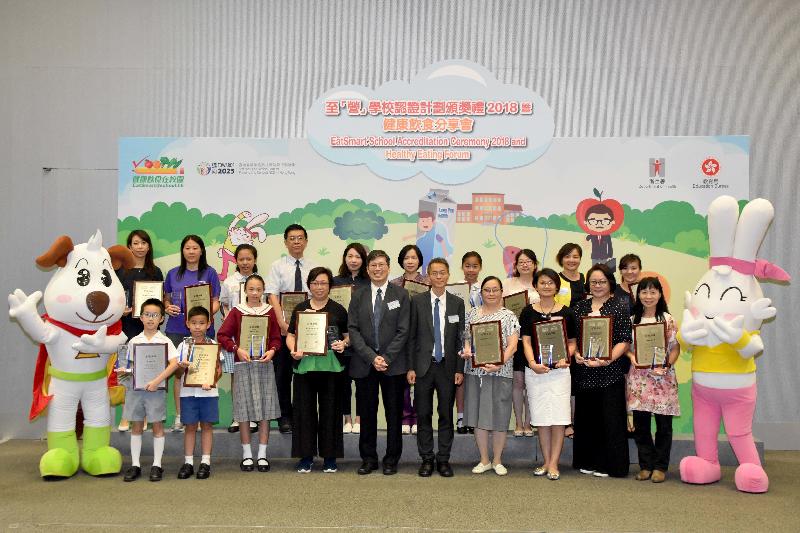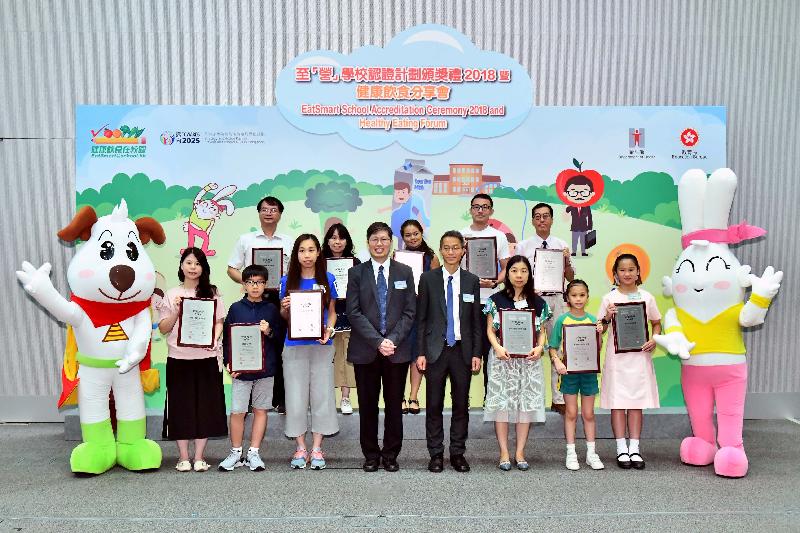A total of 105 primary schools have been awarded the highest honour of EatSmart School under the EatSmart School Accreditation Scheme (ESAS) since the scheme was launched by the Department of Health (DH) and the Education Bureau (EDB) in the 2009/10 school year. The Scheme has helped to build a favourable environment for promoting healthy eating at school, as well as encourage and cultivate good eating habits for students.
Addressing the EatSmart School Accreditation Ceremony 2018 and Healthy Eating Forum held today (July 6), the Acting Director of Health, Dr Wong Ka-hing, said that over 260 primary schools, representing about 40 per cent of all primary schools in Hong Kong, had participated in the ESAS since its inception. Among them, 137 had attained accreditation, of which 105 achieved the highest honour of EatSmart School. The school accreditation is valid for three years. This year, 19 schools achieved the EatSmart School accreditation for the third consecutive time, as compared to nine last year, and were presented with the Award for Continuous Promotion of Healthy Eating at School. The result is encouraging.
Dr Wong pointed out that the overweight and obesity rates of primary school students in Hong Kong have continued to drop, from 22.2 per cent in the 2009/10 school year to 17.6 per cent in the 2016/17 school year. However, the obesity rates of secondary school students rose from 18.7 per cent in the 2010/11 school year to 19.9 per cent in the 2016/17 school year.
Dr Wong said, "The problem of non-communicable diseases (NCDs) caused by unhealthy eating, including low intake of fruit and vegetables and consumption of food high in salt, sugar or fat content by students cannot be neglected. To combat the threat of NCDs, the Government this year announced the 'Towards 2025: Strategy and Action Plan to Prevent and Control Non-communicable Diseases in Hong Kong', setting out nine local targets to be achieved by 2025, which include halting the rise in prevalence of raised blood pressure, diabetes and obesity as well as attaining a 30 per cent relative reduction in mean population daily intake of salt/sodium. Successful prevention and control of NCDs relies on collaborative efforts by various important stakeholders including government bureaux and departments, academia, non-governmental organisations, the private sector and individuals." He encouraged all stakeholders to keep on nurturing a nutrition-friendly environment for learning and living for students from a young age.
The ESAS is a key programme under the EatSmart@school.hk campaign launched by the DH. According to the ESAS accreditation criteria, accredited schools have to demonstrate a commitment to continuously implementing administrative measures, providing healthy lunches and snacks in accordance with the nutritional requirements stipulated in the "Nutritional Guidelines on Lunch for Students" and the "Nutritional Guidelines on Snacks for Students" of the DH. They also have to organise educational programmes and publicity events to create a nutrition-friendly school learning environment for students.
Another programme under the campaign is the Joyful Fruit Month event launched in 2007. Dr Wong said that the number of participating kindergartens, primary schools, secondary schools and special schools has reached a record high of 1 353, and all of them have been promoting a joyful ambience for students to eat fruit, nurturing a healthy habit of daily fruit eating among students. This year, the Fruit Comic Colouring and Drawing Competition organised by the DH was well received by the education sector, with over 3 400 submissions from more than 230 primary schools.
Meanwhile, in order to address the problem of excessive sodium in school lunches, the DH rolled out the Salt Reduction Scheme for School Lunches from the 2017/18 school year, under which 13 participating school lunch suppliers have supplied sodium-reduced lunches to more than 450 primary schools in Hong Kong. As of June this year, participating lunch suppliers have developed over 1 000 sodium-reduced lunch options for schools. Dr Wong expressed the hope that the overall sodium level of school lunches could be reduced gradually, helping students to develop healthy eating habits.
Acknowledging the 12th anniversary of the EatSmart@school.hk campaign, Dr Wong said that he was grateful for the support and guidance of the EDB and members of the EatSmart@school.hk Campaign Steering Committee over the years. He also expressed his sincere gratitude for the active participation and support of principals, teachers, parents and students from different schools, as well as the co-operation of lunch suppliers, in helping to nurture a nutrition-friendly environment for learning and living on campus. He appealed to all parties to carry on supporting the campaign and promoting healthy eating.
Also officiating at the ceremony, the Principal Education Officer (Curriculum Development) of the EDB, Mr Cheng Ming-keung, said, "The EDB has always attached great importance to the development of students' physical and mental health. To lead a healthy lifestyle is one of the learning goals of the school curriculum. With respect to the promotion of healthy eating, the EDB has expended much effort in leveraging the school curriculum, school administration and home-school co-operation to guide our students to develop healthy habits, which has helped lay a good foundation for building a healthy lifestyle."
  
More information on the ESAS is available at the DH's thematic website (school.eatsmart.gov.hk).




